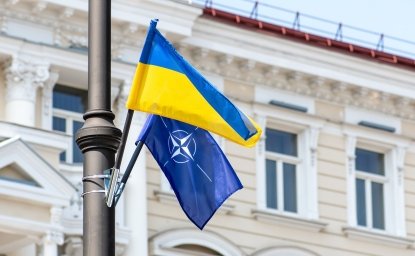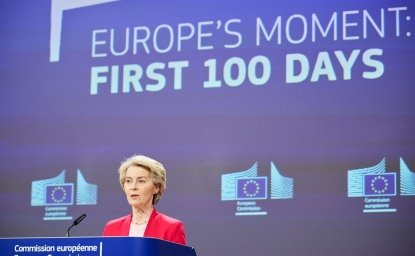280. The European Union, the Balkans and Turkey: Can "Soft Power" Bring Stability and Democracy

Milada Anna Vachudova is Assistant Professor of Political Science at the University of North Carolina-Chapel Hill. She spoke at an EES noon discussion on October 14, 2003. The following is a summary of Professor Vachudova's presentation. Meeting Report 280.
The European Union (EU) is widely recognized as the international actor with the most potential influence in promoting ethnic reconciliation, shoring up democracy and supporting the economic revitalization of the Balkans. The EU's influence is immediate—providing humanitarian aid, economic assistance, market access and political support. It is also long-term—shaping the tenor of domestic politics by offering the prospect of EU membership. The prospect of EU membership may be more diffuse, but it is ultimately more powerful. It provides substantial and consistent incentives for political moderation and reform on the part of elites in the Balkans and also in Turkey. The World Bank's 2001 report noted that its strategy for the region is "built upon the assumption that a credible commitment to integration with European and global structures, especially the European Union, is a critical ingredient of success, as it will serve as an external driver of reform and intra-regional integration."
The EU's policies toward the Balkans have become embedded in the much broader process of EU enlargement that has followed the collapse of communism in Europe's eastern half. The EU has had a hand in bringing national and ethnic reconciliation, stable democracy and economic revival to parts of Europe after the end of World War II, and then again after the end of the Cold War. Since 1989, building liberal democracies and market economies in East Central European states has been profoundly influenced by the process of attaining membership in the EU.
Unpacking democratic conditionality and the leverage of the EU
As I argue in my forthcoming book, Europe Undivided (Oxford University Press, 2004) the tremendous benefits combined with the substantial requirements of membership have set the stage for the EU's unprecedented leverage on the domestic policy choices of aspiring member states. At no time in history have sovereign states voluntarily agreed to meet such vast domestic requirements and then subjected themselves to such intrusive verification procedures to enter an international organization. Earlier applicants for EU membership had less to do: East European applicants have to create democracy and completely rebuild the economy and the state administration, while attempting to adopt the whole of the EU's acquis communautaire, which is itself growing day by day.
I argue that in observing the outcomes of democratization and economic reform, we see an "EU advantage" favoring liberal democracy and market-oriented reforms in states that are credible future EU members. The puzzle is one of causation: Does the EU only accept liberal democracies as members? Or, as I argue, does the condition of being a credible future EU member (for reasons of geography and geopolitics) create incentives that compel elites to make the policy decisions that put them on the road to liberal democracy? The Balkan states will be the toughest test—but a clear one, since the EU has committed itself to their accession. However, this argument casts light on the problem of Turkey. It is difficult to tell whether EU leverage is really working as well as it could in Turkey since Turkey's credibility as a future EU member (should it meet all of the requirements) is constantly being questioned because of its geographic, geopolitical, cultural and economic characteristics. Turkish elites are not responding to the same incentives since Turkey is not unambiguously a credible future EU member.
The changing role of the EU in the Balkans
Now, eight states in East Central Europe have met EU standards, and are poised to enter the EU in 2004. Yet several more states in the Eastern and Western Balkans still have a long road to travel before they qualify for EU membership. Once the first enlargement takes place, all of Eastern Europe's post-communist states outside of the Balkans (and of the former Soviet Union) will have become EU members in 2004. This means that after 2005 the overriding challenge of the ongoing accession process will be to keep the seven Balkan states anchored in the process of European integration. At the Feira summit in June 2000, the European Council confirmed that "its objective remains the fullest possible integration of the countries of the region into the political and economic mainstream of Europe…All the countries concerned are potential candidates for EU membership."
Since 1999, the clear prospect of EU membership has provided a relatively constant set of incentives for elites to pursue strategies of regional peacebuilding, ethnic tolerance and economic reform. Before 1999, however, this prospect was much less clear—and the logic of qualifying for membership certainly failed to overpower domestic political forces with very different agendas in Croatia or Serbia. The prospect of eventual EU membership failed to motivate leaders in many Balkan states to follow a path of reform compatible with joining the EU as rapidly as possible. But it did not fail to motivate all of them: Slovenia demonstrates that a post-Yugoslav state (if not necessarily a "Balkan" one) could muscle its way into the first wave of EU enlargement by succeeding in its political and economic reforms. Poverty may have foreclosed this path to Albania or Macedonia, but not to Croatia or even the Federal Republic of Yugoslavia (FRY). Here, the roadblock to EU membership was the nationalism and the opportunism of certain political elites in conditions of state creation, economic insecurity and intermingled ethnic geography.
Given the fact that the EU was so unsuccessful in promoting democracy, protecting ethnic minority rights and preventing war in the 1990s in the former Yugoslavia, can it be successful in the 2000s? Does the EU have better tools for influencing domestic politics in Balkan states than it did ten years ago? Or have domestic conditions changed such that the EU's tools are more effective? Both are true. The EU has developed better tools for promoting the integration of the Balkans into Europe—chiefly because its strategy toward the Balkans has become anchored in the process of EU enlargement. This new strategy has stemmed directly from the EU's frustration with its own failures and its determination to become an effective international actor.
Meanwhile, the domestic conditions in the Balkans have become more conducive to EU influence as governments of extreme nationalists have been replaced by those of Western reformers. Still, these are the toughest cases, and the obstacles are considerable. Alongside economic backwardness, very feeble state institutions and weak civil societies, some Balkan states have to overcome hostile relations between ethnic minorities and majorities, and cycles of political extremism brought on by brutal ethnic cleansing and war.
To understand the challenges faced by the EU in integrating the seven Balkan states—Bulgaria, Romania, Croatia, FRY, Macedonia, Albania and Bosnia-Herzegovina—we may imagine them as falling into four groups according to the capacity of an elected government to conduct meaningful reform. Bulgaria and Croatia are in the first group. The governments in both countries have been able to implement fairly successful reforms in conditions of relative consensus. For Bulgaria, the EU played a significant role in keeping the pro-reform government of the Union of Democratic Forces (UDF) committed to reform during its term. The UDF lost the June 2001 parliamentary elections—but not to the Bulgarian Socialist Party that sought to slow reform and play on nationalist views. For Croatia, the capacity of the state to govern along with relative economic prosperity could well allow it to overtake Romania, unless the return of the Croatian Democratic Union (CDU) in the November 2003 elections derails Croatia's relationship with the EU.
Romania and the FRY are in the second group. Romania has been negotiating with the EU along with Bulgaria since 1999, but reforms have generally been unsuccessful because of a lack of consensus and state competence. The FRY meanwhile suffered a terrible decade at the hands of nationalist leaders, but it seems to have emerged with a state administration largely intact and with at least the potential for strong political leaders. In the third group we have Macedonia and Albania. Here, elected governments are weak and state administrations very feeble so the project of overcoming tremendous economic backwardness is daunting. Finally, in the fourth group we have Bosnia-Herzegovina along with Kosovo—entities that are run as international protectorates, so the question of promoting reform by creating the right incentives for local elites plays out at quite a different level.
Mechanisms for promoting and locking in reform
If EU leverage has worked in promoting democratic consolidation in East Central Europe, the policy challenge is to sustain, adjust and improve this leverage so that it can work even in the much tougher cases of the western and eastern Balkan states. After the exit of rent-seeking elites, westernizing governments in the Balkans are faced with the political task of implementing the difficult economic reform and ethnic reconciliation that were purposefully thwarted by the previous government. EU requirements include economic reforms that lead to short-term economic hardship for the population. Ethnic reconciliation is also divisive in countries where the population has been conditioned to feel threatened by the minority, and where domestic political discourse has been heavily ethnicized and polarized by ethnic violence.
The EU's ‘traction' on reform-oriented governments comes from three sources or mechanisms. First, it comes from the EU's intermediary rewards of aid and market access—benefits that would be difficult for any government to give up. Second, it comes from the accession process itself, which serves as a commitment device reassuring domestic economic actors and foreign investors about the future course of reform and of economic growth. Locking the applicants into the EU legal and regulatory frameworks also promises to limit corruption and improve administrative capacity, while entering the EU is expected to raise output and growth rates. Third, it comes from the characteristics of the EU's pre-accession. In particular, the EU must guard the meritocratic nature of the accession process while also continuing to enforce the requirements of membership, in order to give elites in distant and poor states hope of equal treatment without giving them expectations of an easy pass.
The imperative of intermediary rewards and the future of the EU's CFSP
Intermediary rewards are of great importance since reform-oriented elites in many Balkan countries face so many domestic political challenges to strengthening democratic institutions, promoting ethnic tolerance, and implementing economic reform. Such rewards help boost the performance and shore up the popularity of reform-oriented elites in government. Many Balkan states are still far from reaching the kind of domestic political consensus on securing EU membership that developed in Hungary and Poland in the early 1990s. In those countries, it did not much matter who won the elections, but in several Balkan states there are still anti-European and illiberal parties waiting in the wings of parliament. Western actors including the European Union therefore need to concentrate on helping smooth the challenges faced by reform-oriented elites. The rewards short of EU membership which are the most effective in shoring up popular support for westernizing governments in Balkans, however, are also the most difficult for the EU to deliver on account of the costs they will impose on the EU's member states. These rewards include complete and unilateral access to the EU market for agricultural goods and visa-free travel to the EU for Balkan citizens.
The EU's Common Foreign and Security Policy (CFSP) backed up by the European Security and Defense Policy (ESDP) may work in the western Balkans because the EU has a range of effective tools that can be used for countries that are credible future members of the EU. In other words, the most powerful and successful aspect of EU foreign policy has turned out to be the incentive of EU enlargement—and the western Balkan region is where EU enlargement can be used to make the CFSP a success. The success of the CFSP will be measured by its ability to apply the instruments available to the EU—trade agreements, visa requirements and the incentives of EU membership—to fulfilling its declared foreign policy goals, even if this entails overruling the short-term interests of some member states and incurring substantial economic costs. In order for the Balkans to become stable, democratic and prosperous, the region's moderate elites must hold power, and revitalize the economy. All the while, these elites must fend off extremist forces by convincing voters that difficult economic and institutional reforms will lead to greater prosperity and to EU membership. For its part, the EU must help convince them by providing intermediary rewards that demonstrate the merits of European integration.
The success of the EU's enlargement project will therefore ultimately determine the success of its CFSP. The EU's influence over its periphery stems from the attraction of future membership in the club. Whatever military capability the EU may develop, it will be a trivial source of influence in comparison to the carrot of membership. It follows that whether or not the EU will be taken seriously as a foreign policy actor will depend on its ability to bring stability and democracy to its immediate periphery—the western Balkans.
Author
Assistant Professor, Department of Political Science, University of North Carolina, Chapel Hill

Global Europe Program
The Global Europe Program is focused on Europe’s capabilities, and how it engages on critical global issues. We investigate European approaches to critical global issues. We examine Europe’s relations with Russia and Eurasia, China and the Indo-Pacific, the Middle East and Africa. Our initiatives include “Ukraine in Europe”—an examination of what it will take to make Ukraine’s European future a reality. But we also examine the role of NATO, the European Union and the OSCE, Europe’s energy security, transatlantic trade disputes, and challenges to democracy. The Global Europe Program’s staff, scholars-in-residence, and Global Fellows participate in seminars, policy study groups, and international conferences to provide analytical recommendations to policy makers and the media. Read more

Explore More
Browse Insights & Analysis
The Growing Transatlantic “Big Tech” Rift Explained

The EU's Role in the Future of European Defense

